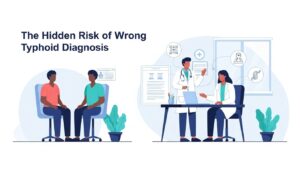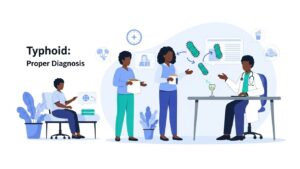Pelvic Inflammatory Disease (PID) is a significant health concern in Nigeria, particularly among women of reproductive age. This article aims to provide valuable insights into PID, addressing common concerns, symptoms, causes, and the importance of early detection and treatment, with a focus on the Nigerian context.
What is PID?
PID is an infection of the female reproductive organs, including the uterus, fallopian tubes, and ovaries. It often arises when sexually transmitted bacteria, such as Chlamydia trachomatis and Neisseria gonorrhoeae, spread from the vagina to these upper reproductive organs.
Importance of Awareness in Nigeria
In Nigeria, the prevalence of PID is a significant health concern. Here are some key statistics and insights:
- Annual Cases: It is estimated that over 1 million women in Nigeria experience an episode of acute PID each year, with a notably higher incidence among teenagers and first-time mothers.
- Prevalence Rates: Research indicates that the prevalence of PID can vary by region. For instance:
- A study in Osogbo reported a 70% prevalence of PID among women attending a tertiary hospital.
- In Nguru, the prevalence was found to be 62.8%.
- Awareness and Education: Awareness of PID among women is relatively low, with only 30% of participants in a study being aware of PID and its implications for infertility.
- Associated Risks: The condition is often linked to untreated sexually transmitted infections (STIs), with Chlamydia and Gonorrhea being the primary causes. Women with multiple sexual partners and those not using condoms are at a higher risk of developing PID.
These statistics highlight the urgent need for increased awareness, education, and preventive measures regarding PID in Nigeria.
Symptoms of PID
PID symptoms can be subtle or even absent in some cases. When present, symptoms may include:
- Lower abdominal pain: This can range from mild discomfort to severe pain.
- Unusual vaginal discharge: This may be heavy, yellow or green, and have an unpleasant odor.
- Bleeding: This can occur between periods or after sexual intercourse.
- Pain during intercourse: Many women report discomfort during sexual activity.
- Fever and chills: A high temperature may indicate a more severe infection.
- Painful urination: This may present as frequent or difficult urination.
Causes of PID
The primary cause of PID is bacterial infections, particularly those transmitted through sexual contact. The most common culprits are:
- Chlamydia: Often asymptomatic, it can silently cause damage to the reproductive organs.
- Gonorrhea: This infection may present with more noticeable symptoms, prompting women to seek treatment sooner.
Other factors that can contribute to PID include:
- Vaginal infections: Such as bacterial vaginosis.
- Surgical procedures: Including the improper insertion of an intrauterine device (IUD) or abortions.
Risk Factors
Certain behaviors and conditions can increase the risk of developing PID:
- Having multiple sexual partners.
- Engaging in unprotected sex.
- Previous history of STIs.
Complications of PID
If left untreated, PID can lead to serious complications:
- Infertility: Scarring of the fallopian tubes can prevent eggs from traveling to the uterus, significantly increasing the risk of infertility.
- Ectopic pregnancy: This occurs when a fertilized egg implants outside the uterus, often in a fallopian tube, which can be life-threatening.
Diagnosis and Treatment
Diagnosis of PID typically involves a physical examination and may include tests to identify STIs. Treatment usually consists of a course of antibiotics, which may be prescribed for 14 days. It is crucial to complete the entire course of medication, even if symptoms improve, to ensure the infection is fully cleared.
Preventing PID
Preventative measures are essential for reducing the risk of PID:
- Use condoms: This is the most effective way to prevent STIs.
- Regular STI screenings: Women who are sexually active should get tested at least once a year.
- Prompt treatment of STIs: Early intervention can prevent the progression to PID.
Conclusion
Understanding PID is vital for Nigerian women’s health. Awareness of symptoms, causes, and preventive measures can empower women to seek timely medical care. If you suspect you may have PID or are experiencing any related symptoms, consult a healthcare provider promptly. Early diagnosis and treatment can significantly reduce the risk of long-term complications, ensuring better reproductive health.
For further information, consider visiting a healthcare provider or a sexual health clinic to discuss any concerns you may have regarding PID or STIs.
Contact Well-Life Hospital
At Well-Life Hospital, a renowned infertility treatment centre located at No. 12 Atbara Street, Wuse 2, Abuja, FCT, we are dedicated to providing compassionate and comprehensive care to help you on your journey to parenthood. To learn more about our IVF services and to book a consultation, visit our website or contact us today.
- Website: welllifehospital.com
- Instagram: @welllifehospital
- Facebook: Well Life Hospital
- Twitter: @Well_Life_H
- TikTok: @welllifehospital
- YouTube: Well Life Hospital
- Mobile : +234 906 000 4314
… Your wellbeing is our goal






